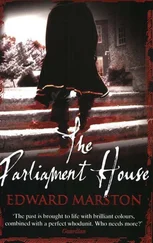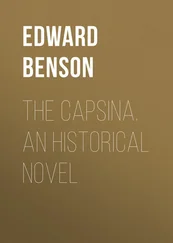Edward Benson - The House of Defence. Volume 1
Здесь есть возможность читать онлайн «Edward Benson - The House of Defence. Volume 1» — ознакомительный отрывок электронной книги совершенно бесплатно, а после прочтения отрывка купить полную версию. В некоторых случаях можно слушать аудио, скачать через торрент в формате fb2 и присутствует краткое содержание. Жанр: foreign_prose, на английском языке. Описание произведения, (предисловие) а так же отзывы посетителей доступны на портале библиотеки ЛибКат.
- Название:The House of Defence. Volume 1
- Автор:
- Жанр:
- Год:неизвестен
- ISBN:нет данных
- Рейтинг книги:3 / 5. Голосов: 1
-
Избранное:Добавить в избранное
- Отзывы:
-
Ваша оценка:
- 60
- 1
- 2
- 3
- 4
- 5
The House of Defence. Volume 1: краткое содержание, описание и аннотация
Предлагаем к чтению аннотацию, описание, краткое содержание или предисловие (зависит от того, что написал сам автор книги «The House of Defence. Volume 1»). Если вы не нашли необходимую информацию о книге — напишите в комментариях, мы постараемся отыскать её.
The House of Defence. Volume 1 — читать онлайн ознакомительный отрывок
Ниже представлен текст книги, разбитый по страницам. Система сохранения места последней прочитанной страницы, позволяет с удобством читать онлайн бесплатно книгу «The House of Defence. Volume 1», без необходимости каждый раз заново искать на чём Вы остановились. Поставьте закладку, и сможете в любой момент перейти на страницу, на которой закончили чтение.
Интервал:
Закладка:
But after a minute or so he got up, thereby interrupting the blissfulness of sensation, for Maud would wonder why he tarried. And as he went downstairs a third thought, suggested by that secret friend in the brown bottle, occurred to him. He must not let his sister know that he had taken a second dose to-day, and, arising from that, he must conceal from her how suddenly and completely the pain had gone, lest she should guess or suspect. Already he felt half ashamed of the mixed motive which had led to his taking it, yet … yet the supreme sense of physical well-being that was his just now prevented him from feeling acutely anything but that. And if Maud suspected up to the point of asking him if he had dosed himself again? Well, in that case it would be wise to follow the example of Sir Walter Scott. She had no business to ask such a question; his answer, whatever it might be, was her responsibility, not his. Perhaps it would be better to minimise the possibility of her asking; he had better appear silent and suffering till dinner was nearly over, and then confess that dinner had done him good. She had told him that it would; she would be delighted to see the efficacy of her prescription. And that the pain left him suddenly would be no surprise to her. Often it left him as suddenly as it came on – as if it was the turning of a tap.
All this flashed instantaneously into his mind, just as a man takes in a landscape at a glance, though it may take him many words to describe what a moment’s vision has conveyed to him. Another thought flashed there too. There was authentic Paradise in that little bottle; whether one had been in pain or not, there was the Garden of Eden. He felt that he would willingly endure tortures if at the end he could push open those golden gates again, and walk past the flaming sword of its guardian. Pain weighed light compared to those pleasures, and surely half an hour of Paradise now and then could not hurt him, a drop of water on the lips of Dives. He felt perfectly willing, weighing the two in the balance of his mind, to pass through hells of torture for that compensation. Then faintly and far away came the suggestion that even without the hours in hell there was Paradise still open.
Maud had been very hungry, and had already finished soup when he came downstairs, and, according to his plan, he said little or nothing till he had caught her up on the “something roast.” Indeed, his first question had been the demand for a second supply of that, and Maud gave him an approving nod. He had eaten no lunch, and now, as soon as he began to eat, he was conscious of being extremely hungry, and the second supply vanished with the same briskness as the first. Then he leaned back in his chair as plates were changed.
“I don’t like telling you that you are right,” he said, “because it will only confirm your belief in your own wisdom. But I am nothing if not honest. Dinner or suggestion or both have certainly done the trick. The Lady Neuralgia has turned off the tap – turned it off with the same firm hand as she turned it on. It doesn’t even drip. I will allow, even, that it was your suggestion that made her do it. Who cares how it happened? I will allow anything. Yes, two roast apples, please, and I think we will have toasted cheese. I had no lunch, you must remember.”
“Oh, Thurso, I am so glad,” she said. “And I so often wish I could take some of it – no, not toasted cheese, you silly – for you.”
“I don’t think you would wish it so much when you had got it,” he remarked.
“Oh, I don’t say I should like it. But I know I could bear lots of pain if I knew that otherwise it would be somebody else’s. The difficulty would be if it was only your own. And, I tell you frankly, you bear it most awfully well. You are cross with me because you know I don’t mind – ”
“At breakfast, do you mean?” he asked. “I know I was. I am sorry, but I was mad with it. You don’t think I show it to other people, do you?”
“No, dear, only to me, or I shouldn’t have mentioned it.”
He looked at her a moment in silence, then he laughed, but grew grave again before he spoke.
“No; you understand,” he said, and then the poisonous fumes of the drug stirred and recommended caution in his brain. “I think you would always understand,” he said. “I think I would always tell you everything.”
“About to-day, then,” said she. “You may tell me about it now. Oh, how wise I was not letting you talk before dinner! I’m sure you were taking a neuralgic view.”
“I was. I was thinking only of poor Sandie, who, they are afraid, is dying, instead of thinking about Donald Fraser’s wife, who seems to be a little better, though yesterday they thought she could not live. It was the Lady Neuralgia who made me remember the one and forget the other. There was something else, too, I wanted to talk about with you. It’s this, Maud. I made the plan only this morning: I couldn’t have told you before.”
He paused a moment. That last sentence, again, was, though absolutely true, an effort of self-justification. He had acquiesced in deceiving Maud on one point, should that point come forward; he felt as if he had to tell not only her, but himself, that he was showing the whole truth about this.
“I know you will feel with me,” he said, “though no doubt Catherine will make a fuss when she knows, if she ever does, and will probably paint everything with carbolic. But I must turn this house into a hospital for all those poor folk – for all, at least, who can be moved here. Think of it! A case appears in one of those tiny houses, and what happens? There are three, or perhaps four, rooms in them, and the whole of the family has to live in two rooms, or at the most three. The sick-room, too, where it is most important that there should be plenty of air – it is ten feet by twelve, and one small window! Dr. Symes agrees with me. He thinks, at any rate, that any case would have a much better chance up here. The moving is easy. They have one ambulance bed, and I have ordered more to-day from Inverness.”
He lit a cigarette, and saw Maud looking at him with shining eyes. This was the Thurso whom she knew and loved. Then he went on:
“There’s the big dining-room here,” he said: “it will hold a dozen beds. There is the hall: it will hold eighteen, I should think. There are all the bedrooms; there is the billiard-room. Also, up here every nurse can look after twice the number of patients that she can attend to in scattered cottages, and look after them all much better. So I have given orders. Dr. Symes will move up here to-morrow all those whom he thinks can be moved without undue risk. All fresh cases will come up here at once. Of course, you will go back to town. I – I appreciate tremendously your coming here at all, but now it will be impossible for you to stop in the house.”
Maud laughed.
“And you, dear?” she asked.
“Me? Oh, I shall stop here, of course. I can’t leave.”
Maud left her place, and dragged a chair up beside him.
“Thurso, you are admirable,” she said. “It’s an excellent idea moving them up here, so excellent that I wonder I did not think of it first. But as for my going back to town – ”
“But how on earth can you stop here with the house crammed full of typhoid patients?”
“Same way as you can. I leave here when you leave.”
“But, Maud – ”
“There isn’t any ‘but, Maud.’ I don’t go unless you turn me out into the cold bleak night – oh, let’s poke up the fire, I am sure there is a frost! – in which case I shall die of exposure on the lawn. To begin with, there is no risk of infection, and, to go on with, I shouldn’t catch it if there was.”
“Oh! Why not?”
“Because one is mercifully allowed to get through the day’s work. I came up here as your ‘pal.’ And if I went to bed with typhoid I couldn’t be anybody’s ‘pal.’ Besides, I’ve had typhoid already. At the present moment I am going to play you at picquet, and you owe me nine shillings from last night.”
Читать дальшеИнтервал:
Закладка:
Похожие книги на «The House of Defence. Volume 1»
Представляем Вашему вниманию похожие книги на «The House of Defence. Volume 1» списком для выбора. Мы отобрали схожую по названию и смыслу литературу в надежде предоставить читателям больше вариантов отыскать новые, интересные, ещё непрочитанные произведения.
Обсуждение, отзывы о книге «The House of Defence. Volume 1» и просто собственные мнения читателей. Оставьте ваши комментарии, напишите, что Вы думаете о произведении, его смысле или главных героях. Укажите что конкретно понравилось, а что нет, и почему Вы так считаете.











